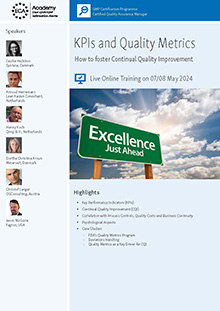Managing CAPA and Investigation Processes still in the Focus of Inspectorates

Recommendation
7/8 May 2024
How to foster Continual Quality Improvement
Deviations and CAPA remain hot topics in inspections. The inspectorates' summaries of their observations show that things do not always work as desired. Recently, the U.K. authority MHRA (Medicines and Healthcare Products Regulatory Agency) published its Top Ten Deficiency Categories. The report "GMP Inspection Deficiencies 2013" covers 630 inspections performed in 2013. According to the report, "deficiencies relating to 'Quality Systems' are by far the most prevalent observed during inspections".
The most common deficiencies during the time frame considered are listed below:
1. Investigation of anomalies
2. Quality management
3. Investigation of anomalies - CAPA
4. Contamination, chemical/physical (or potential for)
4. Supplier and contractor audit
6. Quality management - change control
7. Documentation - procedures/PSF/TAs
7. Personnel issues - training
9. Design and maintenance of equipment
9. Documentation - manufacturing
9. Finished product testing - chemical
As in the previous year, the investigation of anomalies is again at the top of the list. Observations concerning CAPA issues already follow on the third position.
What are the reasons for this? The MHRA published a set of frequently asked questions (FAQs) concerning Quality Risk Management (QRM) already in 2010. The questions and the relevant answers give a good overview and useful tips on how EU inspectorates inspect QRM elements in relation to the ICH Guidelines Q9 and Q10 and how they intend to enforce them. The British authority has emphasised particularly that all inspectorates will include QRM processes in the future, since they are required in chapter 1 of the EU-GMP Guide (Part 1). This includes the handling of complaints, the management of deviations and CAPA.
Taking a closer view at the examples of the defect area findings it becomes obvious that root cause analysis, impact assessment and associated actions are still challenging for many companies.
Related GMP News
GMP Conferences by Topics
- General Quality Assurance and GMP Compliance Topics
- Hygiene
- General Microbiology Topics
- Regulatory Affairs
- Development
- General Analytics Topics
- Good Distribution Practice
- Sterile Manufacturing
- Computer Validation
- General Qualification/Validation Topics
- General Engineering Topics
- APIs/Excipients
- GMP Basic Training Courses
- Medical Devices and Combination Products
- Packaging and Packaging Material
- Data Integrity
- Qualified Person (QP)
- GMP Auditing
- Documentation
- Cleaning Validation
- General IT Compliance Topics
- Impurities
- OOS / OOE / OOT
- Material Testing
- Validation of Analytical Methods
- Analytical Instrument Qualification
- Stability Testing
- Microbiological Testing
- Technology
- General Manufacturing Topics
- Solid Dosage Forms/Semi-Solid Dosage Forms
- Biotechnology/Blood/ATMP
- Herbal Drug Products/Cannabis/Radiopharmaceuticals
- Others




